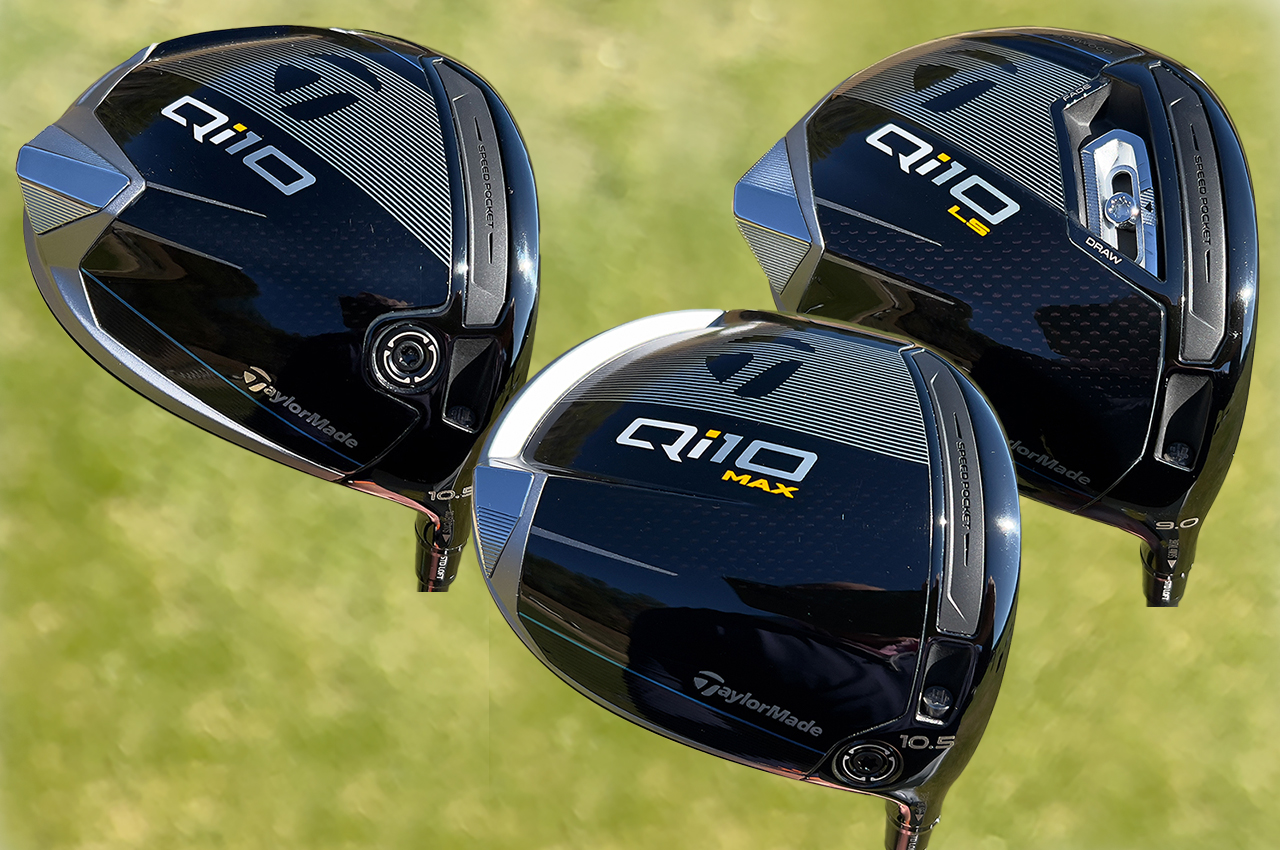Gear: TaylorMade Qi10, Qi10 Max, Qi10 LS drivers
Price: $599 each for Qi10 and Qi 10 Max with Fujikura Speeder NX TCS shaft, Fujikura Ventus Blue TR shaft or Mitsubishi Tensei AV Limited Blue shaft and Golf Pride Z-Grip grip. $629 for the Qi10 LS with the same shaft options.
Specs: 60-layer carbon fiber face, carbon fiber crown and sole with Speed Pocket slot, adjustable hosel and moveable weight (Qi10 LS).
Available: Feb. 2, but available for pre-sale NOW
Who They’re For: Golfers who want to maximize forgiveness without sacrificing distance (Qi10, Qi10 Max), or players who need a low-spin driver that also delivers shot-shaping and adjustability (Qi10 LS).
The Skinny: By making the carbon fiber crown in the Qi10 drivers larger and shifting weight to optimal positions, TaylorMade added company-best forgiveness to its newest driver family while helping golfers gain ball speed and accuracy.
The Deep Dive: For decades, golf equipment makers have tried to balance a paradox about drivers. The traits that often produce more ball speed and distance can diminish stability, but increasing a club’s moment of inertia and making it more resistant to twisting on off-center hits can come at the price of ball speed. In other words, getting more of one typically means giving up some of the other.
In the Qi10 driver family, specifically the Qi10 Max driver, TaylorMade set out to change that, bringing more forgiveness and a higher moment of inertia to drivers while also delivering more ball speed.
Designers did three things: Used more lightweight materials, reshaped the head and put weight in places where it does the most benefit.
They started by increasing the amount of carbon fiber on the top of the club. It had covered 79 of the top in the company’s recent Stealth 2 model, but in the Qi10 Max the carbon fiber is up to 97 percent thanks to a design called Infinity Crown that nearly eliminates the ledge the carbon fiber rests on.
The crown now weighs only 15 grams and attaches to a 16-gram carbon composite ring in the back of the head. That part also holds a nine-layer, 21-gram carbon fiber sole plate along with a 71-gram titanium front piece that encircles the face and attaches to the hosel.
Those ultra-light materials allowed TaylorMade to make the Qi10 Max driver bigger than the Stealth 2 Max from front to back. It’s noticeable when you sole the driver behind the ball. The longer head creates more areas where mass can be positioned – specifically, a 32-gram weight in the back of the sole and internal mass pads behind the face.
In terms of stability, the result is the Qi10 Max is the first TaylorMade driver to have a combined moment of inertia of 10,000 g-cm2. That’s what the Qi10 name stands for: Quest for Inertia 10,000.
There are three different Qi10 drivers, and each shares several technologies.
The face of the three Qi10 drivers is designed using 60 layers of carbon fiber, which is then covered by polyurethane. While the hitting area does not have “Twist Face” printed on it, the company’s technology has been designed into the hitting area, so the high-toe and low-heel areas peel back more to help golfers hit straighter shots. The faces also were designed with an off-center Inverted Cone on the inner-facing side, so they are slightly thicker in the high-middle area and thinner around the perimeter to maximize speed. All three Qi10 drivers also have a Speed Pocket designed into the sole.
In the Qi10 drivers, however, the face is now attached to a redesigned ledge and perimeter area, which TaylorMade said allows the off-center portions of the face to flex more, broadening the sweet spot and protecting ball speed on mis-hits. The redesigned face area is also more durable than the hitting area in the company’s previous Stealth and Stealth 2 drivers.
There is a TaylorMade chevron behind the topline. However, most golfers will benefit from using the white line added to the top of the hitting area as they address the ball. It’s a feature that initially debuted in the Stealth 2 fairway woods and that TaylorMade staffers loved.
All three Qi10 drivers have a 460-cubic-centimeter volume and have an adjustable hosel that lets players and fitters increase or decrease the loft and adjust the lie angle.
The Qi10 Max is available in 9-, 10.5- and 12-degree versions and is the most stable and the largest looking in the address position. It is also the easiest to square up on the downswing, so if you are a player who rarely hits the center of the face and struggles with an inconsistent, two-way miss, this likely will be the most-appealing option.
The standard Qi10 (9-, 10.5- and 12-degree options) looks slightly smaller at address than the Max version, and it produces less spin and a lower ball flight than the Qi10 Max. However, it has a higher moment of inertia than the Stealth 2 it replaces and should produce slightly less spin.

The heel area of the TaylorMade Qi10 LS driver’s sliding weight track is covered for better aerodynamics. (David Dusek/Golfweek)
The Qi10 LS (8-, 9- and 10.5-degree options) is the lowest-spinning club in the family and the only one with an 18-gram sliding weight that can give the club a draw or a fade bias. The heel portion of the weight track is covered by the sole for better aerodynamics. The Qi10 LS spins less than the Stealth Plus+ or Stealth 2 Plus+.
Below are several close-up images of the Qi10, Qi10 Max and Qi10 LS drivers.

Share this

Share this

Share this

Share this

Share this

Share this

Share this

Share this

Share this

Share this

Share this

Share this

Share this

Share this

Share this

Share this



